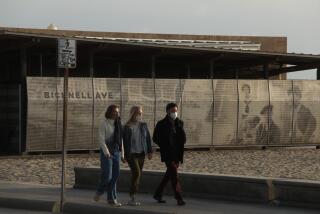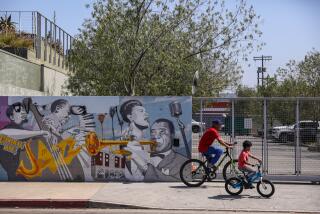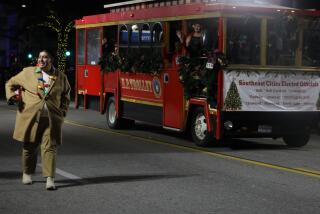South-Central L.A.’s black and Latino business owners join forces with hope for the future
Bowers and Sons Cleaners on Central Avenue has managed to survive many an ill wind in its more than half a century in historic South-Central L.A.
A crack house used to operate across the street. Rioters once showed up determined to burn the place down with Molotov cocktails. The whole casual-dress craze wasn’t great for business either.
But these days, Vivian Bowers — the Bowers daughter who now runs the place — is dreaming big. She’s thinking Central Avenue might be on the cusp of a renaissance. And in her fight to bring back the historic heart of African American Los Angeles, she’s got some new, unexpected allies.
A score of Latino entrepreneurs has banded together to elect Bowers, who is black, president of the new Central Avenue Business Assn. The group meets regularly to press city officials to give the long-neglected neighborhood its due.
“She is an honest person, a very hard-working woman and very dedicated to the community,” said Virginia Zesati, the Mexican-born owner of a Central Avenue hair and nail salon. “We’re all in this together. Among us there are no differences of color.”
Bowers and Zesati have known each other a long time. Zesati and her family live in a home behind the dry cleaners. And on April 30, 1992, when rioters tried to set the dry cleaners on fire, Zesati’s late husband, Gerardo Carrillo, came to the rescue.
“The Fire Department wouldn’t come, so Mr. Carrillo hooked a bunch of garden hoses together and put out the fire,” Bowers said.
Black and Latino people have lived side by side in South L.A. for a generation now. Despite many cultural and linguistic misunderstandings, most of the locals see things in one another they admire — an obvious truth but one not often focused on in the media.
“They are incredibly loyal people,” Bowers told me of her Latino neighbors and customers, as we sat in two lounge chairs near the counter of her family business, started by her father in 1950. It’s a loyalty that comes, she added, with the expectation that they will be treated with respect.
Bowers’ understanding of the Latino community has helped her in the tough work of getting the Central Avenue Business Assn. off the ground. She’s managed to convince at least some of the local Spanish-speaking entrepreneurs to join her in the often frustrating work of making Central Avenue business-friendly.
“This is about our very existence,” said Bowers, a former department-store and healthcare administrator who took over the family business in the early ‘90s.
Among other things, the association is trying to bring a new bank branch to the area. “If we don’t do something to bring in other monies and keep the money that’s here already, we won’t survive,” Bowers said.
The new business association was created by Bowers and activists at the nonprofit Coalition for Responsible Community Development after they noticed that businesses weren’t tapping into city storefront beautification money.
“There was money available, but no one on Central Avenue was using it,” said Johnny Andrade, the coalition’s business liaison. The city Community Redevelopment Agency was threatening to move the funds to another neighborhood.
Bowers quickly emerged as the group’s leader, Andrade said. And now she’s giving her fellow entrepreneurs the benefit of her long experience dealing with the city on issues such as parking enforcement and police patrols.
“Vivian is great at speaking for all of us,” Maria Palmas told me in Spanish. “That’s the most important thing. Because now people are listening to us.... With every meeting, we’re learning something new.”
Palmas and her husband, Jose, opened a grocery on Central Avenue in 1981. Maria kept the store open, even after her husband was killed in a robbery in 1996.
Before she joined the Central Avenue Business Assn., she’d never met with or lobbied a local official. Now a core group of 14 or so Latino business owners joins Bowers in regular meetings with city officials.
“They stay quiet, run their businesses, and don’t get involved,” Bowers said of her Spanish-speaking colleagues. “Slowly but surely they are evolving.”
This is another largely unspoken truth about South L.A. that I’ve seen during the two decades I’ve been going there. Again and again, I’ve met black leaders running traditionally black institutions — including schools and daycare centers — that now serve a mostly Latino community.
Because she was born and raised here, Bowers understands things about doing business in L.A. that some of her fellow entrepreneurs do not.
If you pay your businesses taxes, she tells them, you have the right to ask the city for a loading zone at your curb. You have the right to call your council member and complain about illegal street vending.
“I tell them, ‘This is the way we do things,’ ” she said. “You have to play fair.”
The benefits of following the rules are there to be seen at Bowers and Sons. It has a new awning, paid for in part with redevelopment funds. And a curbside painted green, so customers can almost always find a free space.
Bowers, 58, remembers visiting the family store “toward the end of the glory days” of Central Avenue in the 1960s. She bought her first transistor radio at a record store a block away. The building across the street was home to a savings and loan.
“People were very distinguished in their dress and well-spoken,” she said. And the streets were crowded with pedestrians.
Bowers thinks the glory days of Central Avenue could return. Maria Palma has no memory of those times, but she has the same dream — of a street that comes alive after dark.
“One day, we’ll be able to walk outside at night, or take a sip of coffee at a restaurant without being afraid,” she told me in Spanish. “I’m starting to believe it might happen soon.”
More to Read
Start your day right
Sign up for Essential California for news, features and recommendations from the L.A. Times and beyond in your inbox six days a week.
You may occasionally receive promotional content from the Los Angeles Times.







